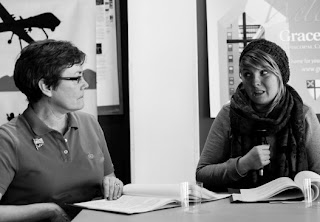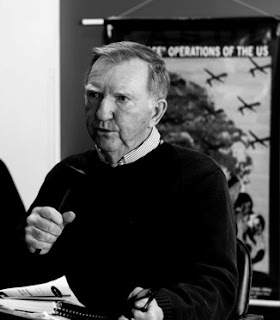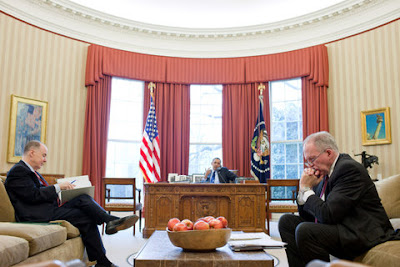[Jack Gilroy previously wrote a two-part meditation on the experience of Irish-Americans and War, including the role of Catholic education in attitudes toward war, and the part played by Irish-Americans in resisting drone warfare and other violence, and in perpetuating it. Here he explores how socially conscious Roman Catholics relate to the tradition of war resistance within the Church, and how that is leading some of them toward anti-drone activism.]
by
Jack Gilroy
In the fall of 2007, a friend, Bernie Survil of Greensburg, PA, and a Catholic priest who worked for decades among the poor of Central America, called to say that he was going to Linz, Austria for the beatification of the Austrian Catholic peasant,
Franz Jagerstatter, guillotined during the Third Reich for his refusal to bear arms for Hitler. Would I please go along for this momentous occasion?
Four of us traveled together to Austria. All of us were practicing Catholics: two priests, one former priest, and myself, a lay Catholic. We were pleasantly dismayed, maybe shocked, that the Catholic Church, an institution that for almost 1700 years partnered with militaries around the world and accepted and sometimes encouraged Catholics to take up arms and fight for their fatherland, would bestow such an honor upon a man who steadfastly refused to fight! This has been especially true in Germany, Austria, Britain, Australia/New Zealand and the United States.
We knew that Catholics were unlike peace church members who refused to train to kill. Catholics were those who often led the charge to prove their love of country by dying for their country. And now, the Vatican is putting one man who refused to render to Caesar as a candidate for possible sainthood? Amazing!
A small group of members of
Pax Christi, an association that started in Europe after World War II to focus on ending war, met in a classroom of Johann Kepler University in Linz. The Americans among the group decided to bring back to the United States the spirit of courage and conscience that Franz Jagerstatter displayed in his refusal to fight for the Nazis.
"FRIENDS OF FRANZ" -- ACTIVISM AGAINST WAR
On the way home from the ceremony in Linz (and a visit to the village where Franziska Jagerstatter, the widow of Franz, still lives), John Dear SJ, who had previously written about Franz Jagerstatter, penned a fine piece for National Catholic Reporter:
"Blessed Franz Jagerstatter".
Fr. Roy Bourgeois said he would work to do a video on Franz, and by 2010 did that with
Franz Jagerstatter: A Man of Conscience, with Martin Sheen as the voice of Franz.
We contacted Orbis Publications and requested that the letters and writing of Franz Jagerstatter be translated and published in the United States. Robert Ellsberg, editor, agreed. (See
Franz Jagerstatter: Letters and Writings from Prison, based on the work of Austrian writer, Erna Putz.)
One of our Friends of Franz members wrote a play,
Franz Jagerstatter—Render to Caesar? - free for download on the Pax Christi website.
With the leadership of Bill Privett of Buffalo, NY, Friends of Franz put together a web site --
Franz Jagerstatter: People For Breaking the Silence -- that we invite people to use. The submission of articles to the web site is not only welcome but encouraged.
ENGAGING THE UNITED STATES CATHOLIC BISHOPS ON WAR
Attempting to move United States Catholic Bishops to take a firm moral stance to end the wars in Afghanistan and Iraq, Friends of Franz meet monthly in an upstate NY lake house to plan strategy. Letters to Catholic Bishops were crafted by Bill Privett of Buffalo with input from other Friends of Franz members. Over several years six letters were sent to over 300 Catholic bishops respectfully requesting them to take a strong stand on war and the preparation for war. Friends of Franz received just one response, a postcard acknowledging the receiving of one of our letters.
Some members went to Baltimore for the annual Catholic Conference of Bishops meeting hoping to make contact. We were not admitted inside but learned that the large dinner gathering for the Bishops was sponsored by the United States Military. Only Bishop John Michael Botean of the Romanian Catholic Diocese of Canton, OH, found the grace to walk up to the peacemakers and engage in conversation. He has proved to be the one friend we are proud to know.
Friends of Franz did other actions to inform Bishops when we embarked on a 40 day fast during Lent in 2009. Some folks camped on cathedral steps (Syracuse, NY), and others gathered in mass in Des Moines, IA, with prayer, signs, petitions. In New Orleans, LA, Friends of Franz supporters waited in sack cloth and ashes for the Bishop as he proceeded into the cathedral for Ash Wednesday Mass. His assistants were given our literature but we received no response from Bishop Alfred Hughes.
THE CATHOLIC BISHOP OF SYRACUSE AND DRONES
Obviously frustrated but not defeated, we have spent over two years trying to arrange a meeting with the
Catholic Bishop of Syracuse. In June of 2012 we did get to hear out the Bishop of Syracuse on the issue of drones. We had sent the Bishop letters and also got to him through one of his diocesan priests. Our strategy was not to preach to him about drones being triggered just a few miles away from his office in downtown Syracuse (
Hancock Air Base), and often ending in assassinations thousands of miles away. We simply asked him his view on the use of drones.
Bishop Robert Cunningham told us that he’d been reading the literature we sent to him on drones and other publications as well. He said he was not ready to make a moral decision on drones. He said he respected our views and admired our attention to this issue of drones and noted that drones keep our soldiers away from foreign places and that is good. He also said that many Catholics work at Hancock Air Base. And drone manufacturing does supply work for people in the area. (For instance, Lockheed is in Syracuse.) We pressed him to take a moral stance but he held off making a commitment.
OUR ACTIVISM CONTINUES: WHO WILL PROTECT THE VICTIMS OF HANCOCK'S DRONES?
Blessed Franz we pray for the Bishops to find the grace and courage you had knowing death would be your fate.
Our focus will continue to be militarism. Our Friends of Franz play,
The Predator, is just one of our efforts to educate the general public about drones.
Ann Wright, the first US diplomat to resign her job when the war on Iraq began, took the role of the activist in
The Predator when it was presented at the Columbus Convention Center, on November 17th, 2012, just a short distance away from the new drone operation at Ft. Benning. Ann thinks the play is very good and hopes it can be used around the country. It has played in a number of venues but as a reading. Several critics note that the play would be even better if memorized rather than read. Friends of Franz hope that college campuses take on the play and perhaps have street theater on campus and community to promote the play. The play can be downloaded from the Pax Christi website:
The Predator.
Ten of our of our Friends of Franz members have been arrested at the Syracuse, NY, drone facility: Mary Snyder, Jim Clune, Dick Keough, Bernie Survil, Mary Ann Grady, Clare Grady, Jack Gilroy, Mark Scibilia Carver, Vickie Ross and Jerry Berrigan. The
Upstate NY Coaltion to Ground the Drones and End the Wars and Friends of Franz would like to see new faces on the line at Hancock where the upstate drone committee is successfully doing
Gandhian Waves. Gates to the Hancock drone base have been blocked numerous times in the past year and a half. Just recently,
the base commander was able to get an order of protection from peace activists who cannot be found 100 feet from the base commander. We, of course, are committed nonviolent activists and neither the Base Commander of the Attack Team nor any of his associates are in danger from us. Apparently, we have to be careful of who is sitting next to us in a diner or pumping gas at a public station. We could be arrested for endangering the leader of the Hancock Attack Force. Friends of Franz would like to see an order of protection given to the families in countries where drone Hellfire missiles are fired.




























